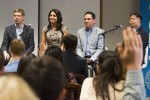Four congressmen told UCLA students Thursday morning their votes were crucial in changing America’s political future.
“There is nothing more powerful than your vote and your voice,” said Rep. Tulsi Gabbard. “We have many platforms available, yet voting is the only thing we have seen to truly affect change.”
Reps. Ted Lieu, Pete Aguilar, Eric Swalwell and Gabbard led a discussion panel, the Future Forum, in Kerckhoff Hall and spoke with 50 students about issues that face millennials today.
Students voiced concerns over student debt and how it could affect whether they attend graduate schools, get jobs or own homes.
Swalwell told audience members he thinks student debt could be a reason millennials are the least entrepreneurial generation so far.
“It raises the question of whether young, inventive minds are being held back because they have debt hanging over their heads,” Swalwell said.
Lieu, who represents the California district that encompasses Westwood, said he thinks millennials’ votes could be enough to elect members of Congress who better understand and advocate for issues millennials are concerned about.
A group of students who participated in the UC Washington Center internship program in Washington, D.C., organized the event, said event host Chloe Pan, a second-year international development studies and Asian American studies student.
Pan added that the group worked with the UCLA Government and Community Relations office to host the event.
“It is important for students and young people to get the chance to talk to their representatives, and engage with them in a way that is genuine and personal,” said Pan.
The congressmen also discussed issues such as immigration and mass deportation. Aguilar said he thinks problems with mass deportation originate from a lack of a comprehensive immigration system. He added he thinks millennials need to vote new members into Congress if they want to change the situation for immigrant families in the U.S.
Representatives also encouraged millennials to vote to increase access to opportunities for immigrant families. Swalwell said he thinks the inevitable shift in America’s demographics means the government will have to enact federal policy that is more tolerant towards immigration.
“In the next decade, 80 percent of the growth in America is going to come from immigrants,” Swalwell said. “With every passing day, the rest of the country is going to look more like California.”
Ruchit Majmudar, a first-year business economics student who attended the event, said he thinks the panel offered millennials working in Congress an opportunity to interact with voters who are their age.
“I came to give input on behalf of me and my generation, and to see what Congress can do to better represent us,” he said.
Audience members expressed their concerns about the inefficiency and inaccessibility of the political system.
“(Millennials) don’t vote because we feel like we don’t matter,” said Antonio Henry, a fourth-year biology student. “It’s more comfortable to sit back and listen.”
Henry added he thinks politicians often ask students to work harder to gain access to opportunities, rather than enact policy that would provide increased access to resources.
The representatives said votes from millennials were essential to combating hateful rhetoric and addressing issues like climate change and police brutality. Gabbard said she thinks young people have influenced politics by voting throughout the course of history.
“(Your votes) will impact our lives and the (lives of the) generations that will come to follow us,” Gabbard said.
